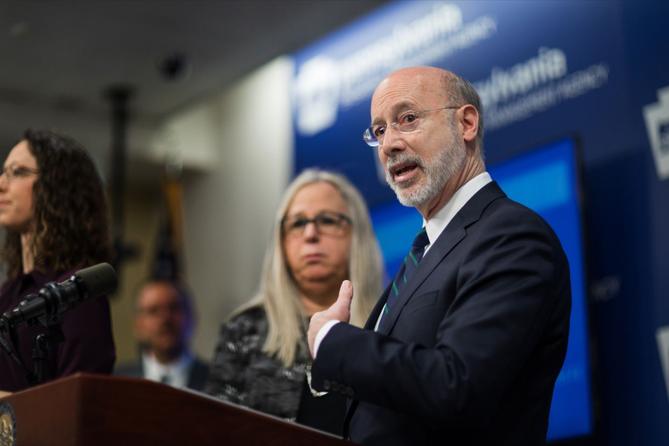Spotlight PA is an independent, nonpartisan newsroom powered by The Philadelphia Inquirer in partnership with the Pittsburgh Post-Gazette and PennLive/Patriot-News. Sign up for our free weekly newsletter.
HARRISBURG — Gov. Tom Wolf’s legacy will be defined, at least in part, on his ability to save lives during the coronavirus outbreak, and he has not shied away from claiming extraordinary emergency powers to close schools and businesses, and order people to stay home.
But one thing he’s been unwilling to do alone is release state prisoners.
Despite wide agreement that something must be done to protect vulnerable inmates — especially those in poor health — and calls for Wolf to grant reprieves on his own, the governor has instead opted to engage his political rivals in the legislature in order to get the task done.
As a result, lawmakers will soon consider a limited plan to release no more than 450 of the state’s nearly 45,000 inmates, a conservative approach that might pass Republican muster but that will further inflame Wolf’s more liberal base, including the ACLU of Pennsylvania.
Either way, the governor faces a difficult political choice, analysts say, as both approaches come with their own risks and potential upsides.
“This is the one thing that can really come back to haunt a governor,” said J. Wesley Leckrone, a political science professor at Widener University.
The legislation as drafted by the Department of Corrections and revised by Republican leadership would allow for the release of inmates convicted of non-violent crimes who are within three months of their aggregate minimum sentence, or those who have a serious medical condition and are within nine months of their aggregate minimum sentence.
Those selected would be sent to a transitional facility or placed under home confinement. If not approved for parole, the person would have to return to prison within 60 days or when the governor’s emergency declaration ends.
Engaging the legislature rather than acting alone allows Wolf to avoid shouldering the complex and high-stakes task alone and dodge political fallout should releases backfire. Still, it’s a narrow path that requires cooperation from Republican leaders in the General Assembly.
“Something like this may not be able to achieve consensus on the timeframe that’s needed to ensure the public health of the prison population, to be perfectly honest,” said Kyle Kopko, an associate political science professor at Elizabethtown College, calling it a “monumental task.”
Wolf spokesperson Lyndsay Kensinger said the governor is “very concerned” about the threat of an outbreak in the state’s prisons and that corrections officials are responding.
“The administration is working with the legislature on a plan to reduce the prison population during this pandemic, but is concerned about releasing anyone without the appropriate transition plan for adequate health coverage and housing,” she said in an email. “The governor is hopeful the legislature will work with him to finalize a responsible plan in the near future.”
Coronavirus cases have continued to rise in Pennsylvania, with nearly 13,000 positive tests and at least 162 deaths as of Monday. Three inmates had tested positive for COVID-19 as of Monday, two at SCI-Phoenix in Montgomery County and one at SCI-Houtzdale in Clearfield County, according to state data.
Corrections department officials, corrections officers, and inmate advocacy groups alike have expressed concerns that the crowded living quarters of prisons could fuel an outbreak. On Wednesday, Reggie Shuford, executive director of the ACLU of Pennsylvania, issued a statement calling Wolf’s failure to use his executive powers “bewildering and inexcusable.”
Rep. Chris Rabb, a Philadelphia Democrat who serves on the House Judiciary Committee, said he believes Wolf should “grant reprieves instead of using the legislative process, which has excluded members from constituencies that are overrepresented in the incarcerated population.”
“This is an opportunity for Wolf to show bold leadership in a time of crisis,” Rabb said.
G. Terry Madonna, a pollster and political scientist at Franklin & Marshall College, said questions about possible recidivism loom large, especially if Wolf uses the reprieve process.
“Even though governors in other states have been doing it, there’s always a certain element of risk in it, and it’s controversial,” Madonna said.
Turning to the General Assembly is also a show of goodwill that could pave the way for future bipartisanship after the worst of the pandemic ends, said Leckrone of Widener University. Lawmakers have passed numerous bipartisan criminal justice reforms in recent years, including bills designed to limit prison stays of lower-risk offenders and automatically seal eligible criminal records.
“Never let a good emergency go to waste,” Leckrone said, adding “maybe this is a time that there can maybe be some really serious discussions about prison reform.”
Former Democratic Gov. Ed Rendell, who served two terms from 2003 to 2011, said worries over political fallout would not sway Wolf in his final term.
“Gov. Wolf will not be running for reelection again, so the political discernment will not have an impact on his decision in terms of making the executive power decision,” Rendell said in a statement.
Still, crises and the subsequent responses tend to define the legacies of former Pennsylvania governors, Madonna said. He pointed to Dick Thornburgh, whose steady hand following the partial meltdown at Three Mile Island gained wide acclaim, and Milton Shapp, whose bargaining prowess helped end a national truckers strike in the 1970s.
Pennsylvania’s first governor, Thomas Mifflin, though, responded to a deadly 18th-century viral outbreak in a manner Wolf is unlikely to repeat, Leckrone said.
When the yellow fever epidemic ripped through Philadelphia during fall 1793, Mifflin and his lawmaker colleagues acted in bipartisan unity: They fled town.
100% ESSENTIAL: Spotlight PA provides its journalism at no cost to newsrooms across the state as a public good to keep our communities informed and thriving. If you value this service, please give a gift today at spotlightpa.org/donate.

